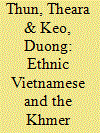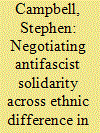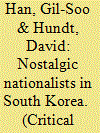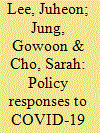|
|
|
Sort Order |
|
|
|
Items / Page
|
|
|
|
|
|
|
| Srl | Item |
| 1 |
ID:
181037


|
|
|
|
|
| Summary/Abstract |
Across the Global South, authoritarian rule and extractivist agendas have intensified the harassment and murder of activists protecting remnant forest frontiers. In 2017, Global Witness documented the brutal murders of 207 defenders, the deadliest year on record. In the Philippines, violence against defenders has recently accelerated under the increasingly authoritarian regime of President Rodrigo Duterte. Excluding drug-related extrajudicial killings, an additional 30 murders were documented in the country in 2018, the highest number of such killings in any country that year. Largely because of expanding plantations and mines, the frontier province of Palawan has experienced a surge in land grabbing and illegal logging, driving defender harassment, intimidation, and death. While scholars have explored the trends and patterns behind violence against defenders in Southeast Asia, few have considered how the rural poor emerge as activists, the role of NGOs in this process, and how defenders negotiate their activism with everyday life and livelihood. This study fills this gap by ethnographically examining how NGOs on Palawan island mobilize rural communities to shape defender practices and by exploring why defenders do what they do amid mounting threats against them, their loved ones, and their comrades across the island.
|
|
|
|
|
|
|
|
|
|
|
|
|
|
|
|
| 2 |
ID:
181032


|
|
|
|
|
| Summary/Abstract |
This paper provides insights on the Communist Party of Kampuchea’s (CPK) ethnic policy through the dynamics of its relationship with ethnic Vietnamese in Cambodia during the 1970s. During Cambodia’s civil war between the CPK and the Lon Nol government, the CPK regarded Vietnamese in Cambodia as supporters of its political movement. The paper demonstrates that although class categorization undermined CPK treatment of Vietnamese and other minority groups (notably Chinese and Cham) throughout the four years (1975–1979) of Democratic Kampuchea (DK), internal plots, suspicions of non-Khmer people, and a war with Vietnam led to the expulsion of the vast majority of Vietnamese in 1975. Expulsion gave way to the mass murder from mid-1977 onward of many of the remaining Vietnamese and mixed-parentage children. By demonstrating how CPK notions of class outweighed those of race, the paper argues that CPK purges against Vietnamese should be understood within the framework of CPK efforts to eliminate suspected enemies from Vietnam rather than stemming from genocidal intent.
|
|
|
|
|
|
|
|
|
|
|
|
|
|
|
|
| 3 |
ID:
181034


|
|
|
|
|
| Summary/Abstract |
The 1989 collapse of the Communist Party of Burma through rank-and-file mutiny, and its splintering into manifold ethnic armed organizations, presaged a weakening of prospects for any leftist project across ethnic lines in Myanmar. These developments coincided with the flourishing of so-called new wars, in Myanmar and elsewhere, organized around identity politics rather than ideology. For liberal critics, such developments confirmed a belief that leftist projects could only ever be an authoritarian imposition over ascriptive ethnic difference. Considering such critiques, this article presents an alternative approach to leftist politics in Myanmar, as advanced by author and journalist Bhamo Tin Aung in his 1963 novel, Yoma Taikbwe, which narrates the emergence of antifascist struggle under wartime Japanese occupation. The book articulates a leftist politics that attends to ethnic difference as an experience grounded in uneven political economy, thus paralleling arguments from the Black radical tradition. In this way, Bhamo Tin Aung pointed to a leftist politics realized through negotiation across difference. It is a politics that remains as pertinent as ever, given worsening class inequality and enduring ethnic chauvinism, in Myanmar and elsewhere, and given the importance of cross-ethnic solidarity in the struggle against military rule following Myanmar’s February 2021 coup.
|
|
|
|
|
|
|
|
|
|
|
|
|
|
|
|
| 4 |
ID:
181036


|
|
|
|
|
| Summary/Abstract |
The 2016–2017 Candlelight Revolution was one of the most significant events in recent South Korean politics, but little attention has been paid to the powerful conservative counter-movement that accompanied and followed the candlelight protests. This counter-movement was symbolized by demonstrations by flag-carriers who found Park Geun-Hye’s impeachment and Moon Jae-In’s inauguration incomprehensible. They argued that Park was innocent, called for her release from prison, and claimed that Moon’s election was illegitimate. An analysis of speeches made during conservative counter-protests between 2016 and 2019 illustrates how these activists reject the values of a new era in South Korean political and economic life. Instead, their speeches conveyed a clear desire to have the legacy of the industrialization generation recognized in contemporary South Korea. These flag-carriers are evidence that a marginalized set of desires and aspirations about South Korean nationalism and identity coexist with the progressive views of the candlelight protesters. The persistence of such an intense and partisan worldview, however, poses a threat to the future of liberal democracy in South Korea.
|
|
|
|
|
|
|
|
|
|
|
|
|
|
|
|
| 5 |
ID:
181033


|
|
|
|
|
| Summary/Abstract |
This article examines the international context of and empirical evidence for the genocide of Cambodia’s domestic ethnic Vietnamese minority in the years 1977 and 1978. It sets out the basis for the scholarly consensus that the state of Democratic Kampuchea (DK), ruled by the Communist Party of Kampuchea (CPK, or “Khmer Rouge”), launched a war against neighboring Vietnam beginning in early 1977 with a series of cross-border attacks. The article then examines the evidence for the simultaneous CPK campaign of near-total mass murder of the approximately 20,000 members of the domestic ethnic Vietnamese community remaining in the country after the killings and forcible expulsions under both the previous regime and the CPK from 1970 to 1976. The article then surveys the CPK’s ethnic policies towards the country’s Vietnamese, Cham, and Chinese minorities, and demonstrates how racist policies often merely masqueraded as class analysis. It concludes with a description of the international legal concepts of both genocide and the crime against humanity of extermination, showing how each applies to crimes the DK regime perpetrated against Cambodia’s ethnic Vietnamese minority.
|
|
|
|
|
|
|
|
|
|
|
|
|
|
|
|
| 6 |
ID:
181035


|
|
|
|
|
| Summary/Abstract |
While South Korean racism and discrimination against migrant workers and foreign brides are not new phenomenon, some early policies adopted by the central and local governments to mitigate the impact of Covid-19 have once again revealed the country’s deep-seated xenophobia. This paper focuses on three government policies – mask rationing, universal disaster relief funds, and local government subsidies – that were adopted during the first wave of coronavirus in South Korea from February until June 2020, when supplies were insufficient and the economy was most severely affected. This paper highlights the fact that government policies were based on nationality, which led to the exclusion of foreign nationals, even long-time taxpaying residents. Such institutional discrimination was blatant, considering the country’s decades-long discussion of multiculturalism. This paper points out that, as a country with a very low number of naturalized citizens, discrimination against foreign nationals not only reflects South Korea’s perceived boundaries of in-groups and out-groups, but also demonstrates the lack of a legal basis that prohibits discriminatory practices.
|
|
|
|
|
|
|
|
|
|
|
|
|
|
|
|
|
|
|
|
|